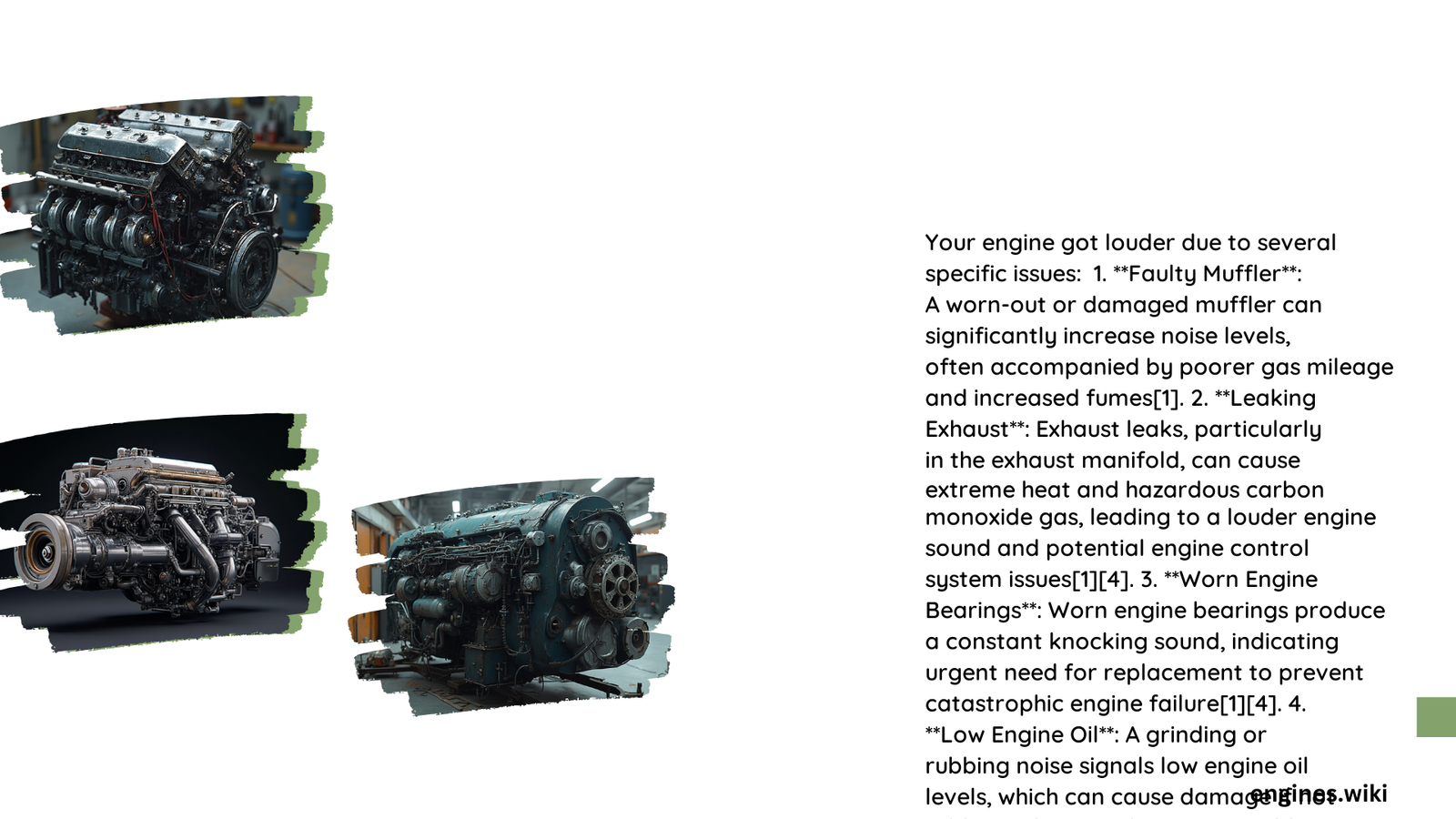An engine becoming louder is often a sign of underlying mechanical issues. Common causes include worn engine components, exhaust leaks, or problems with the air intake or fuel mixture. Understanding these factors can help diagnose the problem and determine the appropriate solution. This article explores the various reasons why an engine might get louder and provides guidance on addressing these issues.
Why Does Engine Noise Increase Over Time?
Engine noise can increase due to several factors:
- Normal wear and tear
- Lack of proper maintenance
- Damage to specific components
- Changes in driving conditions or habits
As vehicles age, various parts may deteriorate, leading to increased friction and noise. Regular maintenance can help mitigate these issues, but some noise increase is inevitable over time.
What Are the Specific Mechanical Reasons for a Louder Engine?

Increased Friction
Increased friction within the engine can cause a significant increase in noise. This can be due to:
- Worn Engine Bearings: When engine bearings wear out, they produce a constant knocking sound under the hood. This increased friction between bearings and moving parts can lead to engine seizure if left unchecked.
- Low Oil Levels: Insufficient or dirty engine oil causes components to grind against each other, resulting in a clattering or grinding noise. Proper lubrication is crucial for reducing friction between moving parts.
Air Intake Issues
Problems with the air intake system can lead to engine misfires, causing:
- Rhythmic knocking or tapping sounds
- Reduced engine performance
- Increased fuel consumption
These issues may stem from:
- Low fuel pressure
- Dirty air filters
- Defective spark plugs
Fuel Mixture Problems
Incorrect fuel mixtures can cause various noises:
- Detonation: A high-pitched metallic pinging noise indicates premature fuel ignition. This can be caused by:
- Improper timing
- Lean air/fuel ratio
- Using the wrong octane fuel
- Engine Misfires: Similar to air intake issues, misfires due to an incorrect air-fuel mixture can lead to knocking or tapping sounds.
How Do Exhaust Leaks Contribute to Engine Noise?
Exhaust leaks can significantly increase engine noise and affect performance:
Sound Characteristics
- Sputtering or Hissing Noise: Exhaust leaks often produce a distinct sputtering or hissing sound, especially if the leak is in the exhaust manifold or other parts of the exhaust system.
Location of Leaks
Leaks can occur in various parts of the exhaust system:
- Exhaust Manifold: Leaks here can trigger the ‘Check Engine’ light and produce loud noise, especially under load.
- Muffler: A damaged or loose muffler can significantly increase engine noise.
- Catalytic Converter: Leaks in this component can affect engine performance and increase noise levels.
- Exhaust Pipes: Damaged or corroded pipes can allow exhaust gases to escape, increasing noise.
Potential Impact on Engine Performance
Exhaust leaks can have several negative effects:
- Loss of power and reduced fuel efficiency
- Disruption of engine control systems
- Potential carbon monoxide hazard in the passenger cabin
Which Worn Engine Components Lead to Increased Noise?
Several engine components can contribute to increased noise as they wear:
| Component | Typical Lifespan | Signs of Wear | Replacement Costs |
|---|---|---|---|
| Belts | 50,000 – 100,000 miles | Cracks, stretching, visible wear | $50 – $200 |
| Pulleys | Vehicle lifetime (may need earlier replacement) | Grinding or rattling noises, visible wear | $100 – $300 |
| Engine Bearings | Up to 200,000 miles or more | Constant knocking sound | $500 – $2,000+ |
| Torque Converter | Up to 100,000 miles or more | Grinding sound when in gear | $500 – $1,500 |
Regular maintenance and timely replacement of these components can help prevent excessive engine noise and potential damage.
What Are Common Loose Muffler Issues?
Loose mufflers are a frequent cause of increased engine noise:
Types of Mufflers Affected
- All types of mufflers can become loose or damaged over time, including:
- Standard mufflers
- High-performance mufflers
- Custom exhaust systems
Methods for Diagnosis
To identify a loose muffler:
- Visual Inspection: Check for visible signs of damage or looseness
- Sound Test: Listen for unusual noises such as hissing, sputtering, or louder engine sounds
- Performance Check: Monitor for poorer gas mileage and increased fumes
Average Time Required for Repairs
- Simple Repairs: Tightening loose muffler components typically takes 30 minutes to an hour
- Replacement: Replacing a muffler can take 1-3 hours, depending on the complexity and labor costs
How Can I Prevent My Engine from Getting Louder?
To prevent your engine from getting louder over time:
- Regular Maintenance: Follow the manufacturer’s recommended maintenance schedule
- Oil Changes: Ensure timely oil changes with the correct type and grade of oil
- Air Filter Replacement: Replace air filters as recommended to maintain proper air intake
- Fuel System Care: Use the correct octane fuel and keep the fuel system clean
- Exhaust System Checks: Regularly inspect the exhaust system for leaks or damage
- Prompt Repairs: Address any unusual noises or performance issues promptly
By following these preventive measures, you can help maintain your engine’s performance and keep noise levels in check.
When Should I Seek Professional Help for a Loud Engine?
Seek professional help if:
- The noise persists or worsens after basic maintenance
- You notice a sudden increase in engine noise
- There’s a loss of power or decrease in fuel efficiency
- Warning lights appear on your dashboard
- You smell unusual odors, especially exhaust fumes inside the vehicle
A qualified mechanic can perform a thorough diagnosis and recommend appropriate repairs to address the underlying causes of increased engine noise.
Remember, addressing engine noise issues promptly can prevent more serious and costly problems in the future.
